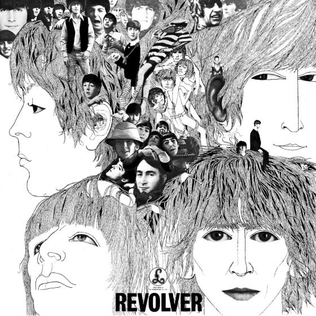
Revolver is the seventh studio album by the English rock band the Beatles. It was released on 5 August 1966, accompanied by the double A-side single "Eleanor Rigby" / "Yellow Submarine". The album was the Beatles' final recording project before their retirement as live performers and marked the group's most overt use of studio technology to date, building on the advances of their late 1965 release Rubber Soul. It has since become regarded as one of the greatest and most innovative albums in the history of popular music, with recognition centred on its range of musical styles, diverse sounds and lyrical content.

Capitol Records, LLC is an American record label owned by Universal Music Group through its Capitol Music Group imprint. It was founded as the first West Coast-based record label of note in the United States in 1942 by Johnny Mercer, Buddy DeSylva, and Glenn E. Wallichs. Capitol was acquired by British music conglomerate EMI as its North American subsidiary in 1955. EMI was acquired by Universal Music Group in 2012, and was merged with the company a year later, making Capitol and the Capitol Music Group both distributed by UMG. The label's circular headquarters building is a recognized landmark of Hollywood, California.

Andrew McLuckie White was a Scottish drummer, primarily a session musician. He is best known for temporarily replacing Ringo Starr on drums for the Beatles' first single, "Love Me Do". White was featured on the American 7" single release of the song, which also appeared on the band's debut British album, Please Please Me. He also played on "P.S. I Love You", which was the B-side of "Love Me Do".

Meshell Ndegeocello is an American singer-songwriter, rapper, and bassist. She has gone by the name Meshell Suhaila Bashir-Shakur which is used as a writing credit on some of her later work. Her music incorporates a wide variety of influences, including funk, soul, jazz, hip hop, reggae and rock. She has received significant critical acclaim throughout her career, being nominated for eleven Grammy Awards, and winning one. She also has been credited for helping to "spark the neo-soul movement".

"Ticket to Ride" is a song by the English rock band the Beatles, written primarily by John Lennon and credited to Lennon–McCartney. Issued as a single in April 1965, it became the Beatles' seventh consecutive number 1 hit in the United Kingdom and their third consecutive number 1 hit in the United States, and similarly topped national charts in Canada, Australia and Ireland. The song was included on their 1965 album Help! Recorded at EMI Studios in London in February that year, the track marked a progression in the Beatles' work through the incorporation of drone and harder-sounding instrumentation relative to their previous releases. Among music critics, Ian MacDonald describes the song as "psychologically deeper than anything the Beatles had recorded before" and "extraordinary for its time".
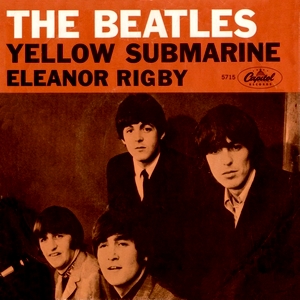
"Eleanor Rigby" is a song by the English rock band the Beatles from their 1966 album Revolver. It was also issued on a double A-side single, paired with "Yellow Submarine". The song was written primarily by Paul McCartney with significant lyrical contributions from John Lennon, and credited to Lennon–McCartney.

Brown Sugar is the debut studio album by American singer, songwriter, and multi-instrumentalist D'Angelo, released on July 3, 1995, through EMI. The album was recorded during 1994 and 1995 in sessions at Battery Studios and RPM Studios in New York City and at the Pookie Lab in Sacramento. Its production, instrumentation, arrangements, and songwriting were primarily handled by D'Angelo, who employed both vintage recording equipment and modern electronic devices. The songs feature earnest lyrics about love and romance, set against a fusion of contemporary R&B and traditional soul music with elements of funk, quiet storm, and hip hop music.

Modern Sounds in Country and Western Music is a studio album by American singer and pianist Ray Charles. It was recorded in February 1962 at Capitol Studios in New York City and United Western Recorders in Hollywood, and released in April of that year by ABC-Paramount Records.

Maurice White was an American musician, best known as the founder, leader, main songwriter and chief producer of the band Earth, Wind & Fire, also serving as the band's co-lead singer with Philip Bailey.

Lee Mack Ritenour is an American jazz guitarist who has been active since the late 1960s.

"The Fool on the Hill" is a song by the English rock band the Beatles from their 1967 EP and album Magical Mystery Tour. It was written and sung by Paul McCartney and credited to the Lennon–McCartney partnership. The lyrics describe the titular "fool", a solitary figure who is not understood by others, but is actually wise. McCartney said the idea for the song was inspired by the Dutch design collective the Fool, who derived their name from the tarot card of the same name, and possibly by Maharishi Mahesh Yogi.

"Please Mr. Postman" is a song written by Georgia Dobbins, William Garrett, Freddie Gorman, Brian Holland and Robert Bateman. It is the debut single by the Marvelettes for the Tamla (Motown) label, notable as the first Motown song to reach the number-one position on the Billboard Hot 100 pop singles chart. The single achieved this position in late 1961; it hit number one on the R&B chart as well. "Please Mr. Postman" became a number-one hit again in early 1975 when The Carpenters' cover of the song reached the top position of the Billboard Hot 100. "Please Mr. Postman" has been covered several times, including by the British rock group the Beatles in 1963. The 2017 song "Feel It Still" by Portugal. The Man draws on "Please Mr. Postman" and includes a credit for Brian Holland.
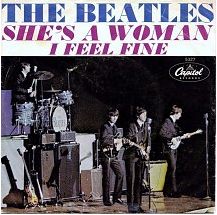
"She's a Woman" is a song by the English rock band the Beatles, written primarily by Paul McCartney and credited to Lennon–McCartney. It was released on a non-album single in November 1964 as the B-side to "I Feel Fine", except in North America, where it also appeared on the album Beatles '65, released in December 1964. Though it was the B-side, it charted in the US, reaching number four on the Billboard Hot 100 and number eight on the Cash Box Top 100. The song originated in McCartney's attempt to write a song in the style of Little Richard. The lyrics include the first reference to drugs in a Beatles song, with the line "turn(s) me on" referring to marijuana.

Shirley Valerie Horn was an American jazz singer and pianist. She collaborated with many jazz musicians including Miles Davis, Dizzy Gillespie, Toots Thielemans, Ron Carter, Carmen McRae, Wynton Marsalis and others. She was most noted for her ability to accompany herself with nearly incomparable independence and ability on the piano while singing, something described by arranger Johnny Mandel as "like having two heads", and for her rich, lush voice, a smoky contralto, which was described by noted producer and arranger Quincy Jones as "like clothing, as she seduces you with her voice".
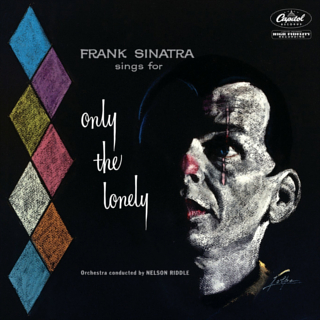
Frank Sinatra Sings for Only the Lonely is the fifteenth studio album by American singer Frank Sinatra. It was released on September 8, 1958, through Capitol Records.
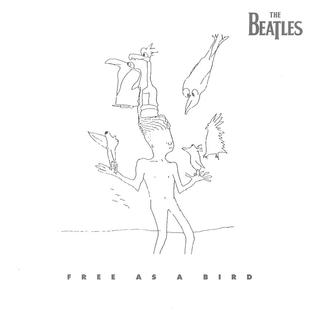
"Free as a Bird" is a single released in December 1995 by English rock band the Beatles. The song was originally written and recorded in 1977 as a home demo by John Lennon. In 1995, 25 years after their break-up and 15 years after Lennon's murder, his then surviving bandmates Paul McCartney, George Harrison and Ringo Starr released a studio version incorporating the demo.

"Letting Go" is a song credited to Paul and Linda McCartney and originally released by Wings on their 1975 album Venus and Mars. The song was remixed and released as a single on 4 October 1975 in the United States, and on 18 October 1975 in the United Kingdom. The song peaked at number 41 in the UK, 41 on the Cash Box Top 100 and number 39 on the Billboard Hot 100.
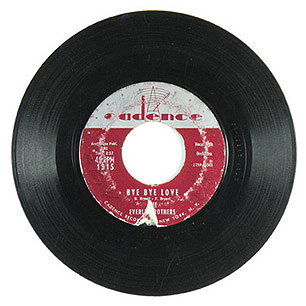
"Bye Bye Love" is a popular song written by Felice and Boudleaux Bryant and published in 1957. It is best known in a debut recording by the Everly Brothers, issued by Cadence Records as catalog number 1315. The song reached No. 2 on the US Billboard Pop charts and No. 1 on the Cash Box Best Selling Record charts. The Everly Brothers' version also enjoyed major success as a country song, reaching No. 1 in the spring of 1957. The Everlys' "Bye Bye Love" is ranked 210th on Rolling Stone magazine's list of "The 500 Greatest Songs of All Time".

"Got to Get You into My Life" is a song by the English rock band the Beatles, first released in 1966 on their album Revolver. It was written by Paul McCartney and credited to Lennon–McCartney. The song is a homage to the Motown Sound, with colourful brass instrumentation and lyrics that suggest a psychedelic experience. "It's actually an ode to pot," McCartney explained. A cover version by Cliff Bennett and the Rebel Rousers, produced by McCartney, peaked at number six in 1966 in the UK. The song was issued in the United States as a single from the Rock 'n' Roll Music compilation album in 1976, six years after the Beatles disbanded. Another cover version by Earth, Wind & Fire from the Sgt. Pepper's Lonely Hearts Club Band film soundtrack peaked at number nine in the US in 1978.
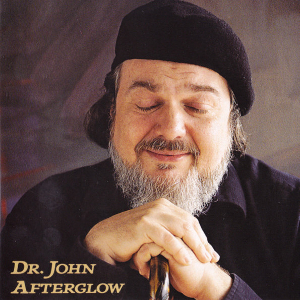
Afterglow is an album by the American musician Dr. John, released in 1995. The majority of the tracks are covers of jazz and blues songs from the 1940s and 1950s; many of the songs were introduced to Dr. John by his parents.



















